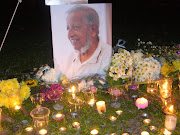Crisis spoils Singapore celebrations
By John Burton in Singapore
Financial Times, Published: February 12 2009
When an apparently deranged man in Singapore set fire to his parliamentary representative at a community event recently, a local website polled its readers to ask which of them deserved more sympathy. By a four-to-one margin, the readers voted for the assailant.
The episode appears to reflect an undercurrent of public discontent with the People’s Action party (PAP) government, which celebrates its 50th anniversary in power this year, as Singapore confronts its worst postwar recession, with the economy expected to contract by up to 5 per cent.
The PAP government has long been one of Asia’s most secure. Singapore’s dominant one-party system has set an example for countries such as China, Russia and the Gulf states. Their leaders “are picking up points here and there” about how Singapore can “keep its ruling party in place and run a tight ship, honest and effective”, says Lee Kuan Yew, the city state’s founding father
But the economic crisis is putting Singapore’s political system to its severest test since independence in 1965. “Officials appear scared about the public reaction. I’ve never seen them so concerned before,” said a Singapore-based regional political analyst.
The economic downturn threatens to expose some of Singapore’s vulnerabilities, including a wide gap between rich and poor and a heavy dependence on foreign investment for growth.
The recession also comes at a challenging time, when the city state must find new manufacturing industries to replace the declining electronics sector and as it embarks on an ambitious plan to become the Monaco of Asia, with private banking and gambling as growth sectors.
The PAP has stayed in power because of an implicit social bargain that it would deliver prosperity in return for restrictions on political freedoms. It has justified its strong rule by saying that liberal democracy could prove divisive in a multi-ethnic society such as Singapore, with its ethnic Chinese, Malay and Indian populations.
Lee Hsien Loong, the prime minister and son of Lee Kuan Yew, recently praised one-party rule for promoting administrative efficiency and good policymaking, compared with malfunctioning” Asian democracies such as Taiwan, with a troubled economy, polarised politics and widespread corruption.
“I don’t think you want that kind of political system in Singapore,” he told the annual PAP congress.
Terence Chong, of the Institute of Southeast Asian Studies in Singapore, says: “Political order and economic stability may go hand in hand, but there is increasing awareness, even within the PAP, that that may no longer work.”
He points to a feeling that the PAP is “out of touch with the general suffering”.
In November, Singapore said it would cut the 2009 salaries of senior government officials by up to 19 per cent in response to the slowing economy.
The government also said recently that it would tighten already strict rules on public assemblies to prevent acts of civil disobedience. But civil activism is growing, and the government is coming under increased scrutiny and criticism on the internet.
“The government hasn’t helped matters by losing billions of dollars by investing in Citigroup and Merrill Lynch,” says a foreign businessman, referring to the $24bn (€18.6bn, £16.7bn) invested by Singapore’s sovereign funds in western financial groups. “The crisis is proving to be a reality check for the authorities.”
Officials are hoping to address public concerns with the recent announcement of a S$20.5bn ($13.6bn, €10.6bn, £9.5bn) stimulus package.
Manu Bhaskaran, of Centennial Group, an economic consultancy, also argues that support for the government remains strong in comparison with neighbouring Malaysia and Thailand, “where there is corruption and mismanagement”.
He adds: “The population doesn’t want to rock the boat in an economic storm and it will support the government, which has a strong record of economic progress and political stability.”
But an element of uncertainty remains about the depth of public support. A third of Singaporeans normally vote against the PAP, despite the weakness of opposition parties. The government must call an election by November 2011. It may decide to call a snap election this year if it fears that the economy will not recover in the next two years, when public discontent might be stronger.
While the PAP is expected to return to power, its nightmare result would be to lose one or more of the five or six-member group representation constituencies (GRCs) that dominate the parliamentary system. Voters cast a single ballot for a party slate of candidates. The opposition, which now has only two seats in the 84-member chamber, would gain its biggest representation in more than 40 years.
“The loss of a GRC would be a psychological blow to the PAP and might encourage more Singaporeans to join the opposition,” says the local political analyst.
Last post here
16 years ago














No comments:
Post a Comment